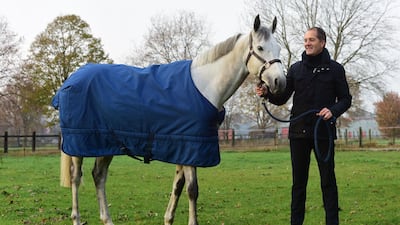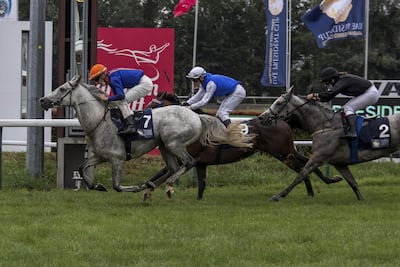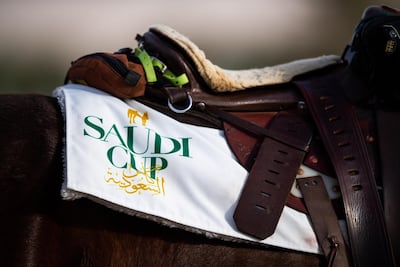Unlike his Argentinian namesake, Messi the horse has had to wait until a little later in life to achieve sporting success. It is only in the past year that the 8-year-old purebred Arabian has started to attain acclaim on the international horse racing circuit – and his success can be largely attributed to the pandemic.
Messi’s Belgian owner, part-time horse trainer Timo Keersmaekers, also runs his own tableware business. Until Covid-19 restrictions grounded him, he would spend up to 80 days a year travelling for work, which left him with little time to invest in training his spirited Arabian stallion.
“Because of the coronavirus, travel was limited, so I decided to focus more on training Messi. Instead of spending my evenings in a hotel room, I would spend that time with him. What we have achieved today is a result of that,” he explains.
And while Keersmaekers admits to not having the facilities or know-how to rival the world’s top horse trainers, Messi’s raw talent has turned him into a serious contender on the pure-bred Arabian racing scene, culminating in a victory in the Sheikh Zayed bin Sultan Al Nahyan Jewel Crown race in Abu Dhabi on December 4. The win garnered the duo $1.3 million in prize money.
Next, they are headed for the $2m Obaiya Arabian Classic at The Saudi Cup. “If you go back to this time last year, you would say: ‘OK, he’s a decent horse to race in Belgium,’” Keersmaekers says.
“But we started to race in Belgium in July, and he did a wonderful job. Then we went to Germany where he finished second in a photo-finish. Next was Paris, where he placed second as well. And then there was the Jewel Crown race. I felt that he was a good horse in the past, but I never realised that he was that good.”
A win in Saudi Arabia would not only offer significant financial gains, it would also provide much-deserved recognition for a horse that, in many ways, is an underdog.
“For me it’s really important,” Keersmaekers explains. “Yes, the money is important, but on the other side, for me it’s more emotional because I think Messi deserves to be recognised. In terms of the way we trained him and the limited knowledge we have, compared to other professional trainers, I almost feel pity for him that we didn’t send him to be trained at the best facilities in the past.
“I would rather not have the money, but have him win the race in Saudi just because it’s him, and because he’s showed over the past year that he really deserves to be a Grade 1 horse.”
This story – of an unrecognised champion who might never have fulfilled his potential if not for an unprecedented global pandemic – is made all the more bittersweet by the fact that because of Messi’s age, Keersmaekers plans to retire him next year. Which leaves a limited window for Messi to show the world the true extent of his abilities.
While Keersmaekers does feel regret that the horse’s talent was not recognised earlier, he is mainly grateful to have discovered it at all. “If he can win a few more races, it will be a pity that it didn’t happen earlier, but on the other side, maybe it is also because of his age and the fact that he is fully grown that he is so strong at the moment.”
While the Obaiya Classic will be a landmark race for Messi, it is also a reflection of how pure-bred Arabian horse racing has grown in stature in recent years.
With the breed more often associated with endurance or show events that focus on its stamina or beauty, it is only in recent years that Arabian horses have become a regular fixture on the race track, and had the opportunity to also showcase their speed.
Which is fitting given that the Arabian is at the root of all horse racing – in the late 1700s, British breeders used the Darley Arabian, Godolphin Arabian and Byerley Turk as the foundation sires to create a whole new breed of horse, the thoroughbred. Today 93 per cent of all modern thoroughbreds can be traced to those three sires, according to the Arabian Horse Association.

Arabian racing is now the fastest-growing segment in the industry, and has almost quadrupled in size in the United States over the past decade. It’s an evolution that Keersmaekers has witnessed first-hand over the course of his career.
“In the beginning, the rotations weren’t the same as those for thoroughbreds. It was very amateur. It really developed with the support of Middle Eastern countries. You can see that they really want to promote this type of racing and the level has increased as a result.”
Characterised by its finely chiselled head, long arching neck, large nostrils, high tail carriage and “floating” trot, the Arabian horse has been intertwined with regional history since at least 2,500 BC, and continues to be revered to this day.
Prophet Mohammed instructed his followers to treat Arabian horses with kindness, and ancient Egyptian hieroglyphs paid testament to their immense value. The Bedouin developed a close affinity with their trusty steeds, using them as war mounts and to execute short, unexpected raids on enemy camps.

“There is a lot of evidence that these horses originated in the Arabian Peninsula, about 4,500 years ago. So there is a lot of history here,” says Salem Binmahfooz, director of racing at the Jockey Club of Saudi Arabia.
“These horses came from here and built a relationship with the Bedouin. They were used for transportation and did very well because of their endurance capabilities.
“In Saudi Arabia, they were crucial to the country’s founder, King Abdulaziz Al Saud. These horses were heavily used and depended upon when this country was being established. The same applied during the 16th and 17th centuries, when a lot of leaders around the world heard about these horses and started importing them from the Arabian Peninsula,” Binmahfooz explains.
Indeed, historical figures such as Genghis Khan, Alexander The Great and George Washington all rode Arabians, notes the Arabian Horse Association. And they have proven to be loyal, steadfast and committed companions. “Throughout their history and heritage, Arabian horses have been known to be loyal to their owners. If you ask them to do something, they will do whatever they can for their owners and trainers,” Binmahfooz says.
This is a trait that Keersmaekers recognises in Messi. Although, as is typical of his breed, the stallion can also be headstrong. “The huge difference between Arabian horses and other horses is when they have something in mind, it’s really difficult to get that out of their mind. For example, Messi doesn’t like the horse walker, so he will do whatever he can to not get in, and if he is in, he will do whatever he can to get out. Thoroughbreds are much easier to ‘manipulate’ and guide. Arabian horses all have their own vision of what they want. And if they want to go for it, they will.
"If Messi wants to run, he will give it his best effort. He had a tendon injury four years ago – and even though he was in the middle of a race when he was injured, he still carried on and finished in fourth place. He’s such a special horse – because of his attitude.”




